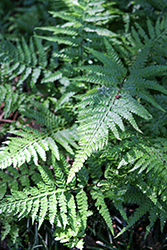It's all about ...
plants

Height: 3 feet
Spacing: 24 inches
Sunlight:
![]()
![]()
Hardiness Zone: 8b
Other Names: Hay-scented Fern
Brand: Monrovia
Description:
Delicate looking, yet sturdy fronds that emerge light green and mature to a medium green, arch gracefully outwards; a spectacular groundcover for a woodland area; does best in light shade, or just morning sun
Ornamental Features
Lace Fern's attractive ferny bipinnately compound leaves emerge light green in spring, turning forest green in colour the rest of the year on a plant with an upright spreading habit of growth.
Landscape Attributes
Lace Fern is a dense herbaceous evergreen fern with an upright spreading habit of growth. It brings an extremely fine and delicate texture to the garden composition and should be used to full effect.
This plant will require occasional maintenance and upkeep, and should not require much pruning, except when necessary, such as to remove dieback. Gardeners should be aware of the following characteristic(s) that may warrant special consideration;
- Suckering
Lace Fern is recommended for the following landscape applications;
- Accent
- Mass Planting
- Groundcover
- Container Planting
- Hanging Baskets
Planting & Growing
Lace Fern will grow to be about 3 feet tall at maturity, with a spread of 3 feet. When grown in masses or used as a bedding plant, individual plants should be spaced approximately 24 inches apart. Its foliage tends to remain dense right to the ground, not requiring facer plants in front. It grows at a fast rate, and under ideal conditions can be expected to live for approximately 20 years. As an evegreen perennial, this plant will typically keep its form and foliage year-round.
This plant does best in partial shade to shade. It is quite adaptable, prefering to grow in average to wet conditions, and will even tolerate some standing water. It is not particular as to soil pH, but grows best in rich soils. It is somewhat tolerant of urban pollution. This species is not originally from North America. It can be propagated by division.
Lace Fern is a fine choice for the garden, but it is also a good selection for planting in outdoor containers and hanging baskets. With its upright habit of growth, it is best suited for use as a 'thriller' in the 'spiller-thriller-filler' container combination; plant it near the center of the pot, surrounded by smaller plants and those that spill over the edges. It is even sizeable enough that it can be grown alone in a suitable container. Note that when growing plants in outdoor containers and baskets, they may require more frequent waterings than they would in the yard or garden. Be aware that in our climate, most plants cannot be expected to survive the winter if left in containers outdoors, and this plant is no exception. Contact our experts for more information on how to protect it over the winter months.
This plant is not reliably hardy in our region, and certain restrictions may apply; contact the store for more information.
